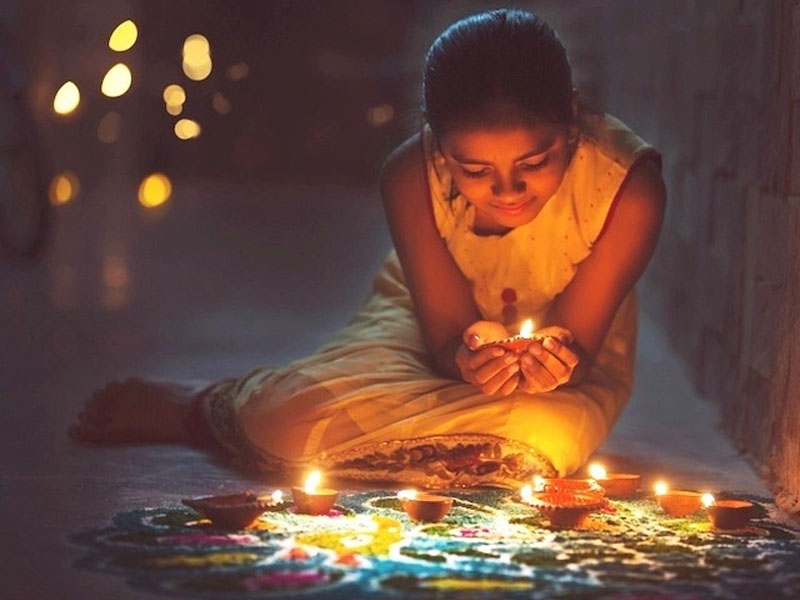Diwali, Deepavali or Deepavali amavasya (amavasya is the day of the new moon every month) is a festival of lights. It’s a five-day celebration between mid-October and mid-November during the Hindu lunisolar month of “Kartika”. Though one of the most popular festivals of Hinduism, it is celebrated by Jains, Sikhs and Newar Buddhists. Indeed, India being a secular nation, it’s celebrated across all religions and even around the world. All the houses, business establishments, small shops, offices and public places are decorated with galaxies of small lamps and nowadays also with electric lampworks of various colours and designs. Diwali comes from the Sanskrit word Deepavali (Dipa= Diya, meaning lamp in English & Vali= Row) which means “rows or arrays of lighted lamps”. Deepa is a small earthen pot wherein, oil is used for fuelling and a string for illumination when it’s ignited. If we think from the spiritual angle, Deepavali symbolizes “awakening of the inner soul” or “victory of light over darkness, good over evil & knowledge over ignorance”. Therefore, it symbolizes the Indian concept of “Satyameva Jayate” (Truth alone triumphs).
The festival is predominantly associated with “ Lakshmi”, the Goddess of prosperity and Lord ”Rama”, the then king of Ayodhya along with many other regional traditional connections involving various other gods and goddesses like Vishnu, Krishna, Yama, Yami, Durga, Kali, Hanuman, Ganesha, Kubera, Dhanvantari and Vishwakarma. In my home state Odisha, we also worship for the moksha of our ancestors during Diwali. The priests come to our houses at midnight for the puja karma. Goddess Lakshmi is worshipped everywhere during the celebration seeking and urging for prosperity in every house and business. It is believed that the whole concept began, when Maryada Purushottam Ram (the ideal man who practised righteousness), the seventh incarnation (Avatar) of Lord Vishnu returned to his kingdom Ayodhya along with his wife Sita and his younger brother Lakshmana after defeating Asura Ravan, the king of Lanka after serving fourteen years of exile (as part of his vachchan or words to his father, King Dasarath).
We Indians and the Indian diaspora, have a nostalgic memory of Deepavali. We look up to the festival every single year. Amidst the gatherings and exchanging of gifts, a huge amount of sweets and dry fruits are also consumed during this five-day celebration. But on the very evening of Deepavali, everyone prefers to stay at their respective homes, wear new clothes, light lamps and do the ceremonial worship of Goddess Lakshmi keeping the doors open and urging her to come in and bestow her blessings for good health, wealth, prosperity, happiness and contentment.
I am a strong supporter of all such traditions (not superstitions) and traditional celebrations. We all know that the only constant thing in life is change. So arguably, everything ought to change with time. On the same note, I must emphasize that it’s good to change for the better or the best, not to the worse or the worst. Because of evolution, revolution and distortion, the meaning around Diwali is also changing but sadly changing for the worst. My concern here, as a citizen, as a good Samaritan and as a heart surgeon (Doctor) is that of the health of my fellow beings and the preservation of the habitat around us. If we consider that the soul or the life, is there inside our body, then our body is the temple. If we wish to retain the life inside then we must take care of our physical body. Being a doctor, it’s my prerogative to ensure the physical, psychological, mental, social and financial health of the people.
Therefore, I must say in the first place, that we have to be a little more cautious while spending, especially during the financial crunch post-covid. This reminds me of the saying “spread as many sheets as you can”, which means, don’t stretch yourself beyond your limit. Those who can afford should be forthcoming in helping their subordinates and the poor.
During the festival, we eat a lot of sweets which are rich in calories and eatables which are rich in saturated fats. These are bad for our hearts and our overall health. These are more hazardous for patients having diabetes, heart ailments and other chronic diseases. Unfortunately, the alcohol intake and smoking become substantially high in the pretext of parties and get-togethers thereby causing accidents, quarrels, financial loss family problems and health issues.
Let’s discuss the crackers which give us a real kick during the celebration of the festival. Now importantly remember, that Diwali is primarily a festival of lights but the noisy and multi-coloured light-emitting crackers cause a lot of noise pollution and most of them contain hazardous gases. The particulate matter generated during Diwali because of crackers is 8 to 10 times higher than the normal times. The crackers which impart a hue of lights contain radio-active heavy metals, which have a tremendous detrimental effect on health. These are aluminium, lithium, mercury, lead, arsenic, sulphur, zinc, copper, sodium etc. The supreme court of India had to ban the use of many of them in the manufacturing of crackers in 2015. It’s a matter of great surprise and shock that the harmful fumes generated by them increase the risk of cancer and also miscarriages. The air and noise pollutions caused by the crackers badly affect people with heart disorders and disorders of the respiratory and nervous systems. They can also cause eye, ear, nose and throat problems. The children should be kept away from the increased level of these compounds in the air as they can limit their growth. A new study out of Germany’s Mainz University Medical centre proved that traffic noise increases the risk of high blood pressure, irregular heartbeats called AF (Atrial Fibrillation), blood clots, stroke, heart attack and heart failure. The additional huge noise pollution created by these crackers would certainly add to these problems. According to Dr. Shilpi Agarwal, a Family physician in the USA, anything that creates agitation, irritation or change in blood pressure can trigger AF. Too much noise can be distracting and stimulating to the brain, making it more difficult to get into a mode of relaxation and ultimately causing poor sleep. It’s a fact to be remembered that even during sleep the brain listens. Disturbed and fragmentation of sleep cause an increased level of cortisol, the stress hormone thereby causing raised sugar in the blood and also vascular dysfunction causing high blood pressure and increased cardiovascular risk. Noise also causes anxiety and stress. The noxious gases increase respiratory problems like asthma and other lung diseases. During this post-covid time when the lungs are already injured, the effect of crackers is certainly going to add to more injury.
Hence, I would certainly suggest and advise the following points.
– Honour the Govt. guidelines of the timings of bursting crackers.
– Use “Green Crackers”- Developed by the Council of Scientific and Industrial Research (CSIR) which are less polluting.
– Burst the crackers at the designated places like an open area, not in the crowds.
– Let’s indulge in more lights and decorations rather than crackers.
– Use protective eyeglasses.
– Take care of our habitats and animals.
– Keep the children, old persons and patients away from crackers.
– Get yourself well clad and not get cold.
– Less alcohol.
– Avoid smoking.
– Less of sweets and more of dry fruits.
– Keep away burns by not getting close to crackers.
– Call for emergency care in case of any accidental injury.
– Call for emergency medical help if anyone falls sick.
With letter and spirit let’s worship Goddess Lakshmi for prosperity and welcome Lord Rama back home. Let’s make this Deepavali a unique and special one in spreading love not hatred, spreading health not illness and bringing happiness home instead of diseases.
 |
Dr.Bikram Mohanty Director & Chief Cardio Thoracic & Vascular Surgeon (Adult & Paediatric), Venkateshwar Hospital, Dwarka, New Delhi |


